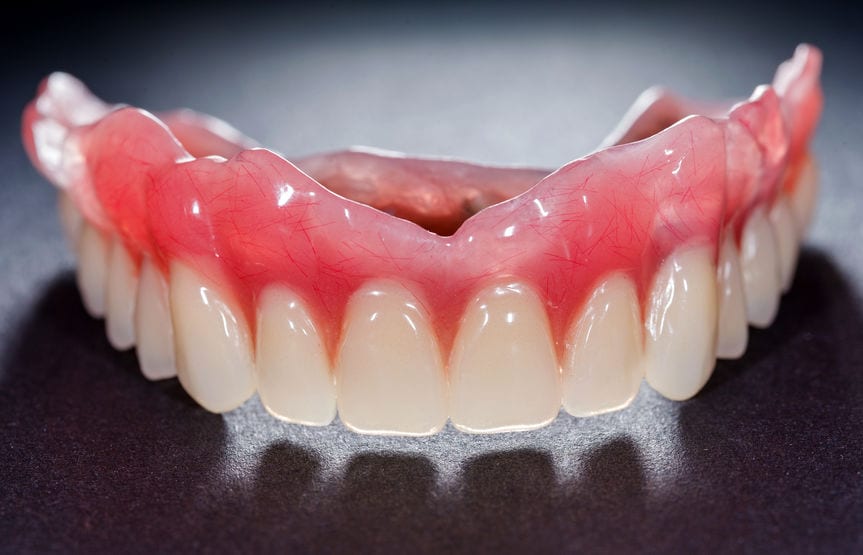
Getting dentures is a big change for your mouth.
If you’ve already gotten them, chances are you are enjoying your new and improved smile, and confident in the ongoing structure and support they will provide. Soon enough, you’ll be back to eating some of your favorite foods pain-free.
However, if it’s not quite as amazing as you thought at the moment, keep in mind that although dentures have come a long way, one thing remains the same: adjusting to life with dentures takes time. There’s surgical recovery, facial muscles adapting to new sensations, your palate adjusting to the way you taste some foods, and your ability to chew and speak.
While you’re approaching the finish line to optimal oral health, here are a few tips for making the last stretch as quick and painless as possible.
TIP #1: Get Fitted
Two things.
One, regardless of the specific number of extractions or the amount of time you were on the table, you just underwent major oral surgery. Depending on the depth and complexity of clearing out even a single tooth, it could take months to simply allow all the swelling to subside.
Second, your new apparatus is a custom-fit prosthetic and should be an exact match to your mouth. It takes time to reach perfection, and may take several adjustments over the first few weeks of wear in order to reach your new normal.
Don’t cancel appointments, and during visits, try to be as specific as possible when describing any pain and discomfort you’ve been experiencing – especially if it doesn’t seem to be improving or going away.
Pro Home Tip: In the meantime, rinsing with warm salt water regularly can help alleviate sore spots – blisters or ulcers – where your new dentures meet the gums.
TIP #2: Be Kind…
…to yourself. You’ll save yourself a lot of agony by setting realistic expectations from the word “go.” It may feel a little embarrassing that you’re having to learn how to speak and eat naturally again, but remember, you have a (probably large) foreign object in your mouth.

Did you know nearly all patients experience hypersalivation early on, too? Initially, your body can’t tell the difference between dentures and food when you first have them placed in your mouth, but rest assured that this will change in time.
You may drool. You might not be able to pronounce words in the same way at first. There will likely be a bit of shock and discomfort (some people even experience a period of grief). The thing to remember is that it won’t last forever. Patience with yourself is key.
Pro Home Tip: Make reteaching yourself fun by singing along to your favorite songs throughout the day – smooth, fluid phrases at slower rates help you practice forming certain words more easily.
TIP #3: “Fix and Forget?” Probably Not
You may have already considered using denture adhesives. If you have, you likely have a heap of questions, too. Denture adhesives aren’t necessary, but the right one may prove a huge benefit when munching on foods requiring a stronger bite (steak, corn on the cob, apples, etc.).
You’re going to want to experiment, however. Talk with your dentist or prosthodontist about what products are on the market and their opinions on each. Then figure out which works best for you. Note, however, that denture adhesive is not a substitute for ill-fitting devices.
Pro Home Tip: While eating, distribute food evenly inside your mouth. It will help keep your dentures more stable while you chew.
TIP #4: Keep Them Clean
Clean your new teeth every day. Colored beverages, bacteria, trapped food (smoking, if you do), and other debris causes deterioration, discoloration, and even nasty odors.
Mild soap and water and denture solution are your options, never toothpaste.
Pro Home Tip: Just like with teeth, tartar and plaque can naturally build up on dentures. Take them with you to the dentist and ask for them to be cleaned during your regular checkup just as you’d ask for a cleaning for your previous teeth.
Finally, your doctor likely sent you home with a stack of literature on taking proper care of your dentures. Before anything else: Do what your doctor tells you.

When we say awkwardness and discomfort is temporary, we mean you’ll most likely experience an adjustment period of one month to six weeks. Following your treatment plan and attending post-extraction appointments in those first few months will get you back to your new normal quickest. Good luck, and happy chewing!






